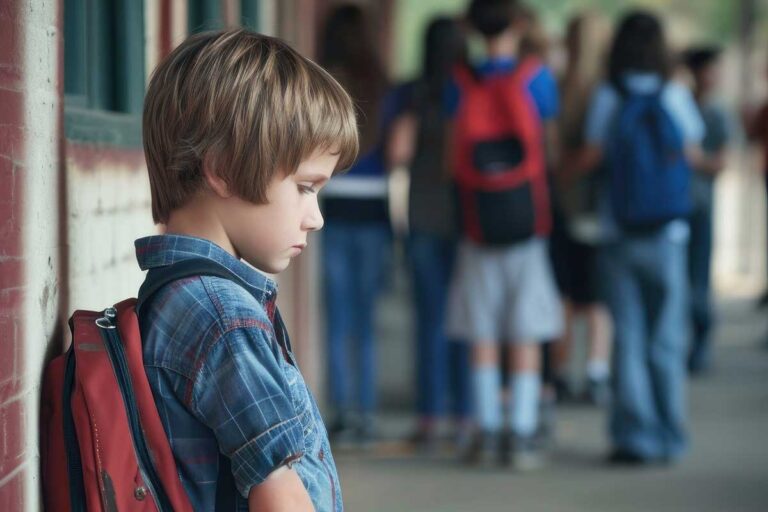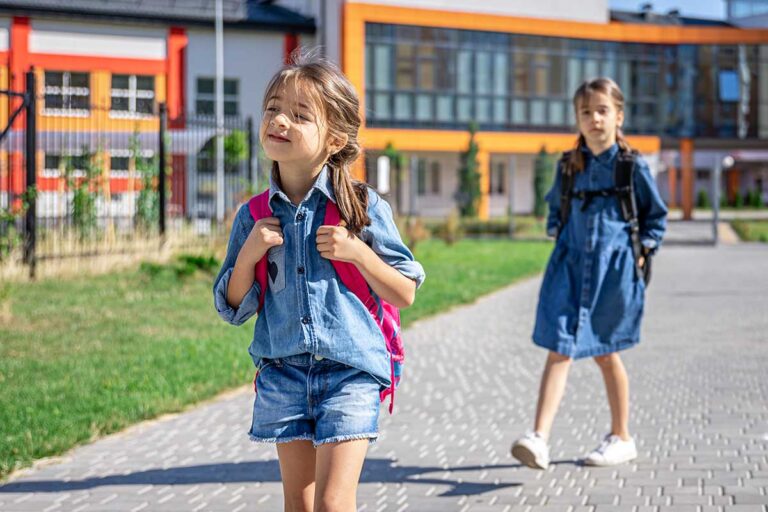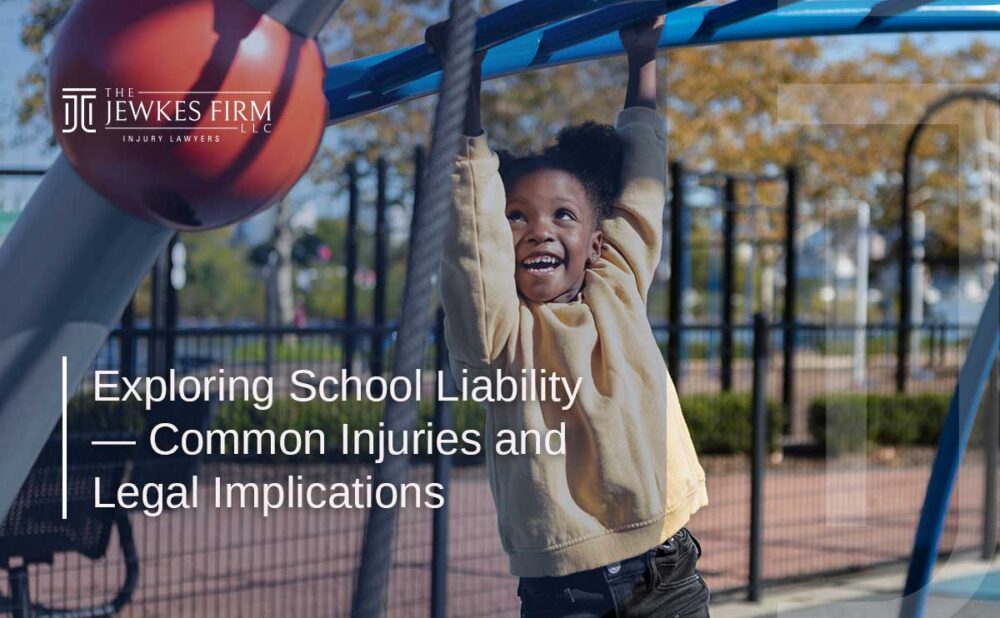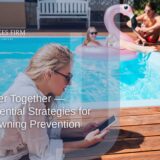Exploring School Liability — Common Injuries and Legal Implications for Georgia Families
Ensuring the safety of children in school environments is a top priority for parents, guardians, and educators. However, accidents can and do occur, leading to injuries that may have significant legal implications. At The Jewkes Law Firm, we recognize the complexities surrounding school-related injuries in Georgia and the potential liability that schools may face, whether your child attends a public or private institution. Understanding school liability laws in Georgia is crucial for parents seeking to protect their child’s rights and secure the justice and compensation their family deserves. In this article, we will explore common school-related injuries, the legal framework surrounding them, and how our firm can assist families in navigating these challenging situations. We aim to empower parents with the knowledge they need to make informed decisions and take appropriate steps if their child get hurt at school.
What is School Liability?
School liability refers to the legal responsibility that schools and their employees have to ensure the safety and well-being of students. Under Georgia law, schools must create a safe environment. This includes maintaining facilities, supervising students, and implementing safety protocols. When a school fails to meet these obligations, it may be held liable for injuries that occur as a result.
Injured in a Rideshare Accident? Contact Us For A Free Consultation
Injured in a Rideshare Accident?
Common Causes of School Injuries
Children can get hurt at school in a variety of ways. Some common causes include:
Playground Accidents and Defective Equipment
Falls from defective or poorly maintained playground equipment are common. Schools often have playgrounds and sports equipment that must meet safety standards. Injuries can occur if this equipment is defective or not properly maintained. Broken surfacing, sharp edges, slippery platforms—these hazards fall under premises liability.
Slip and Fall Accidents
Wet hallways, cluttered stairwells, cracked surfaces can cause serious injuries. Georgia courts hold schools responsible under standard premises liability if they failed to remedy known dangers and expose children to unsafe failities or equipment.
Sports Injuries
Physical education classes and extracurricular sports can result in injuries such as concussions, fractures, and sprains. Schools have a responsibility to ensure that proper safety measures are in place during these activities. From soccer scrapes to gym mishaps, injuries often stem from negligent coaching, lack of supervision, or improper equipment.
Bullying and Assault
Unfortunately, bullying and physical altercations can lead to both physical and emotional injuries. Schools must create a safe space for students and take the right steps to stop bullying. Staff-on-student or student-on-student violence may trigger claims for negligent supervision or intentional torts if the school ignored known threats.
Inadequate Supervision
Injuries can occur when children are not adequately supervised, whether during recess, lunch, or field trips. Lack of supervision can lead to accidents or altercations that could have been prevented.
School Bus and Traffic Hazards
School buses are a common mode of transportation for students. Accidents involving school buses can lead to serious injuries, and schools may be held liable for negligence in ensuring safe transportation. Nearly half of school transport injuries happen during boarding or disembarking, or due to collision-related causes. Georgia allows claims under O.C.G.A. § 36‑92‑2(a) for negligent bus operation.
Exposure to Hazards
Asbestos, lead, or toxins in older buildings pose serious health risks, and schools may be liable for failing to remediate or prevent exposure.
While some accidents are unavoidable, others result from negligence, carelessness, or failure to follow established safety protocols.

When Are Schools Liable for Injuries in Georgia?
In Georgia, schools have a legal duty to provide a safe environment for students. This duty extends to both public and private schools. When a child gets hurt due to negligence, parents may have grounds for a personal injury claim against the school or school district. To prove school liability, an attorney must prove that the school or its employees acted negligently.
- Duty of Care. The school had a responsibility to ensure the safety of its students.
- Breach of Duty. The school failed to meet that responsibility through action or inaction.
- Causation. This breach of duty was the direct cause of the injury.
- Damages. The child suffered real harm—physical, emotional, or financial.
Legal Implications of Child Injuries in Georgia
When a child gets hurt at school, the implications can be significant. Parents may face mounting medical bills, emotional distress, and the need for ongoing care. Understanding these can help parents make informed decisions about how to proceed.
Duty of Care
In Georgia, schools owe a duty of care to their students. This means they must take reasonable steps to ensure the safety of students while they are on school grounds or participating in school-sponsored activities. If a school breaches this duty, it may be held liable for any resulting injuries.
Standard of Care
The standard of care refers to the level of caution and concern an ordinary person would exercise in a similar situation. In the context of schools, this standard may vary depending on the age of the students, the nature of the activity, and the specific circumstances surrounding the incident. For example, the standard of care for supervising young children during recess may be higher than that for older students in a classroom setting.
Comparative Negligence
Georgia follows a comparative negligence rule. This means that if a child is partially at fault for their injury, the amount of money the child can get for their injuries is related to their percentage of fault. For example, if a child gets hurt while engaging in horseplay on the playground, and the court determines they were 20% responsible for the incident, their compensation would be reduced by that percentage.
Types of School Liability
Negligence
This is the most common basis for liability claims against schools. Negligence occurs when a school or its employees fail to act with reasonable care, leading to an injury. For example, if a teacher neglects to supervise students during recess and a child is injured as a result, the school may be liable for negligence.
Premises Liability
Schools have a duty to maintain their premises in a safe condition. This includes regular inspections and repairs of playground equipment, classrooms, and common areas. If a child gets hurt due to unsafe conditions, such as a broken swing or a wet floor, the school may be held liable under premises liability.
Vicarious Liability
Schools can also be held liable for the actions of their employees under the doctrine of vicarious liability. If a teacher or staff member acts negligently while performing their job duties, the school may be responsible for the resulting injuries.
Intentional Torts
In some cases, schools may be liable for intentional acts, such as bullying or physical assault. If a school fails to take appropriate action to prevent or address bullying, it may be held accountable for the harm caused to the victim.
Potential Compensation in Georgia School Injury Cases
- Medical costs (acute care, rehabilitation, therapy)
- Pain and suffering
- Lost educational or extracurricular opportunities
- Emotional distress
- Punitive damages (must prove gross negligence)
In bus-related cases under O.C.G.A. § 36‑92‑2, damages may be capped at $500,000 per person or $700,000 per incident—but districts can waive limits by carrying higher insurance.


GEORGIA PERSONAL INJURY LAWYER NEAR ME
Georgia’s Liability Landscape — Public vs Private Schools
Georgia law distinguishes between public and private schools in terms of legal protections:
Public Schools
Public schools are generally protected by sovereign immunity under Georgia law. To sue, parents must file a Notice of Claim within 12 months under O.C.G.A. § 50‑21‑26(a). Lawsuits proceed if immunity is expressly waived, often in cases involving gross negligence (e.g., bus crashes or negligent security), or when a motor-vehicle is involved.
Private Schools
These institutions do not have sovereign immunity, so it is generally easier to file lawsuits against them for negligence.
Even with these distinctions, proving negligence still requires thorough documentation and legal strategy.
Immunity for Volunteers
Under O.C.G.A. § 51‑1‑30.3, volunteers (and host schools) are immune unless their actions exhibited gross negligence, wanton misconduct, or involved vehicle operation.
New Security Laws and Negligent Security Claims
Georgia’s House Bill 268, enacted April 28, 2025, tightened security standards in public schools—e.g., mandatory staff training, panic buttons, security plans, mental health staffing. Schools that fail to meet these protocols may face negligent-security lawsuits.
Government Immunity and the Georgia Tort Claims Act
Governmental immunity may protect public schools in Georgia, making it more difficult to file claims against them. However, exceptions exist under the Georgia Tort Claims Act (GTCA), particularly in cases of gross negligence or when a school fails to adhere to safety regulations. For example, if a school employee grossly neglects their duties or if a state-owned motor vehicle causes the injury, parents may have grounds to pursue a claim.
Important Note: Under the GTCA, you must file a written notice of claim within 12 months of the injury—sometimes even sooner depending on the specifics of the case.
What Role Does Negligent Supervision Play?
Negligent supervision is one of the most common legal arguments in school injury cases. This occurs when a teacher or staff member fails to adequately monitor students, resulting in injury. Examples include:
- Failing to break up a fight
- Allowing unsupervised roughhousing
- Ignoring complaints about bullying
- Not following safety protocols on field trips or during physical education
School Bus Accidents and Transportation-Related Injuries
Injuries sustained during school transportation can involve multiple liable parties, including:
- The school district
- The bus driver
- A private bus company
- Another negligent driver
Since transportation incidents often involve state-owned vehicles, these cases may fall under the Georgia Tort Claims Act. It’s critical to act quickly due to the shorter notice requirements.
Statute of Limitations
In Georgia, individuals typically have two years from the date of the injury to file a personal injury claim. However, there are specific rules regarding claims involving minors. If a child gets hurt, the statute of limitations may be tolled (paused) until the child reaches the age of majority (18 years old). This means that parents or guardians have until the child turns 18 to file a claim on their behalf.
Need a Free Consultation? Need a Skilled Attorney?
Free Consultation
Call (770) 771-5130
If you’ve been injured, you need to hire the best legal care to assist you with your claim. Get a FREE consultation today!
What Should Parents Do If Their Child Is Injured at School?
If your child gets hurt injured at school, follow these steps:
- Seek Medical Attention. The health and safety of the child should always come first. Ensure that the child receives appropriate medical care and keep all medical records and bills.
- Document the Incident. Gather evidence, including photographs of the scene, witness statements, and any relevant school policies.
- Notify School Officials. Report the injury to school authorities and request an incident report. This can help establish a record of the incident and may be crucial for any future legal action.
- Consult a Personal Injury Attorney. An experienced attorney can help navigate the complexities of school liability and advocate for the rights of the injured child.
- Consider Filing a Claim. If you establish negligence or liability, you may have grounds to file a personal injury claim against the school or responsible parties. Your lawyer can assist you in identifying the most effective course of action.
The sooner you act, the better the chances of preserving evidence and protecting your child’s rights.
How The Jewkes Firm Can Help
Attorney Jordan Jewkes and the team at The Jewkes Firm understand the emotional and legal challenges parents face when a child is hurt. We will:
- Investigate the cause of your child’s injury
- Identify all potentially liable parties
- Navigate state and federal laws, including sovereign immunity and the GTCA
- Work to secure compensation for medical bills, emotional distress, and future care needs
We handle every case with compassion and a relentless commitment to justice.
Your Child Deserves Protection
Accidents at school can have long-lasting consequences—both physically and emotionally. If your child has been injured due to negligence, don’t assume the school is beyond legal accountability. With the right legal guidance, you can hold the responsible parties accountable and ensure your child receives the care and support they need.
At The Jewkes Firm, we focus on advocating for the rights of injured students and their families. If your child has been injured at school due to negligence, don’t hesitate to reach out for a consultation. Together, we can work toward ensuring that your child receives the justice and compensation they deserve.
By understanding common school-related injuries and the legal implications surrounding them, parents can better advocate for their children’s safety and well-being. Your child’s wellbeing is worth fighting for. For more information or to schedule a consultation, contact The Jewkes Firm today at (770) 771-5130. The safety and well-being of your child are our highest priorities.

Frequently Asked Questions
What are the most common school-related injuries in Georgia?
What are the most common school-related injuries in Georgia?
Common school-related injuries include playground injuries, sports injuries, classroom injuries, transportation injuries, and injuries resulting from bullying or assault.
Is the school responsible for bullying or violence between students?
Schools may be held liable if they failed to intervene or ignored warning signs. Typically, this includes claims about carelessness or lack of proper oversight.
What is the Georgia Tort Claims Act?
The Georgia Tort Claims Act (GTCA) explains when people can take legal action against government organizations, such as public schools. It includes strict filing deadlines and notice requirements.
Do private schools have immunity in Georgia?
No, private schools in Georgia do not have protection under sovereign immunity. You can sue a private school for negligence more easily than a public institution.
What is “negligent supervision” at school?
Negligent supervision occurs when school staff fail to properly oversee students, resulting in injury. Examples include allowing bullying, unsafe play, or fights to occur without intervention.





